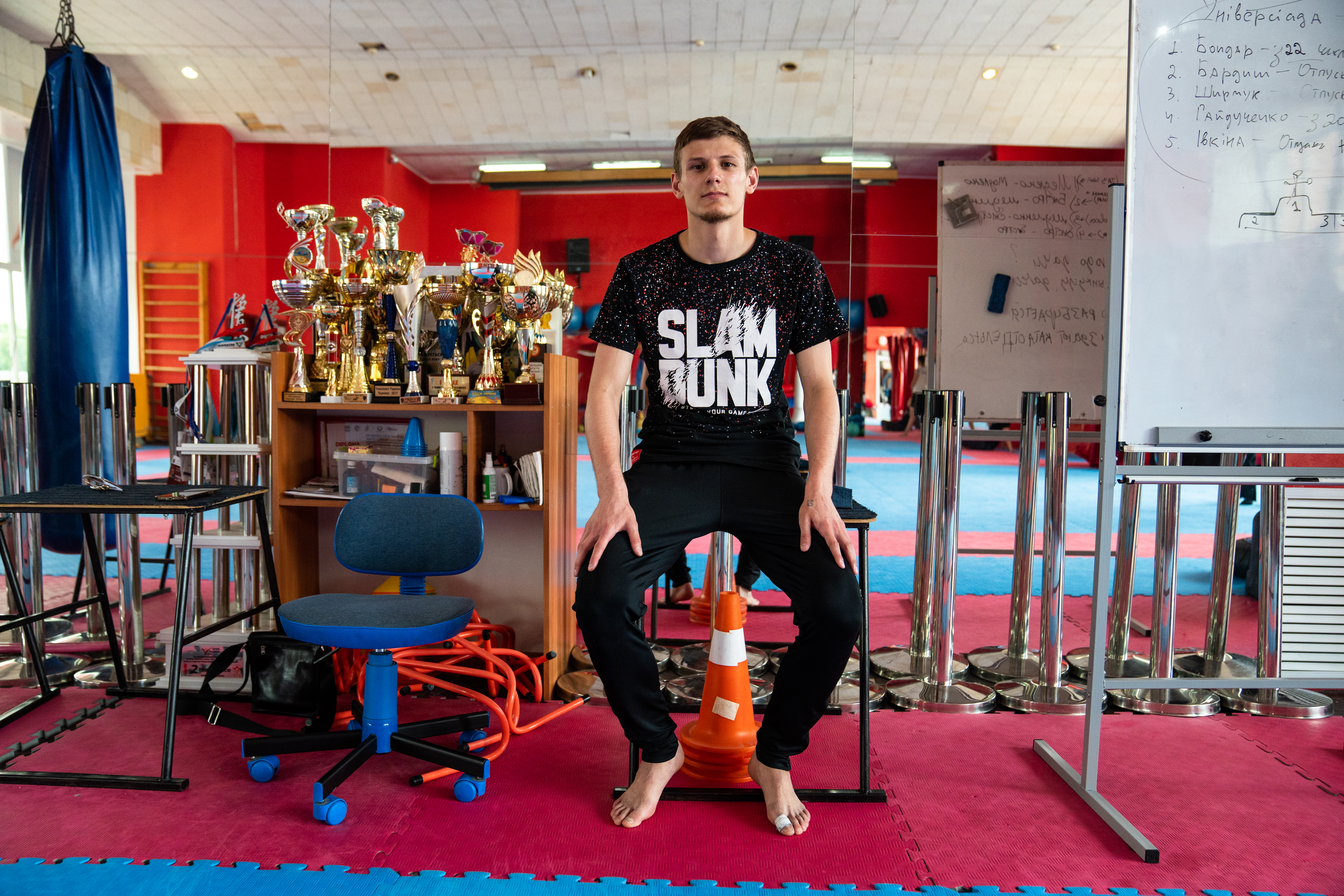Sports complex for people with disabilities opens in Poltava Oblast
September 13, 2023

Karate session at the Kolos sports and rehabilitation complex for people with disabilities in Reshetylivka, Poltava Oblast
Young karatekas get together at a dojo in Poltava. After a short break, they start to train again. Some of them are sparring with real adversaries, while others are fighting invisible opponents. This is how karatekas with hearing impairments trained by the Poltava Regional Children's and Youth Sports School are getting ready for a competition.
Before switching to karate, 22-year-old Yelyzaveta Bondar practiced figure skating and orienteering. “It was not my choice,” says Yelyzaveta. “They signed me up for these classes when I was a child.”
One day students at her school were invited to a karate class. Yelyzaveta liked the training so much that she persuaded her mother to bring her to the class again.

Before karate, Yelyzaveta Bondar (on the right) used to do figure skating
“We do everything through games and it excites them,” says Mykola Bohodystyy, the head coach of Ukraine’s De-Olympic karate team. “Then they work out the techniques and karate sparring.”
This is what made Yelyzaveta change her ice skates to a kimono 6 years ago. During this time, she has already won several dozen awards and improved her self-esteem.
“The main thing is not to use force, but to know that I can do it. Besides, when I say that I practice karate, nobody dares to bother me,” says Yelyzaveta.
Yelyzaveta and other karatekas train 2 hours a day, working out the techniques of “kata” and “kumite” — i.e. fighting with an imaginary or real enemy.
When it comes to “kata,” mirrors are important for improving the techniques.
“Everything matters in “kata” — not only your techniques, but also your emotions,” says Yelyzaveta. “We have to see how we train. The mirror helps us work on ourselves.”

Yelyzaveta Bondar practices her techniques in front of a mirror. Photo: Ihor Tkachov / UNDP Ukraine
The war has changed the situation with karate in Ukraine, says the head coach Mykola Bohodystyy. Some cities and towns are too close to the front line, so it's impossible to hold a competition there. Due to the war, many karatekas also left Ukraine. “Children under 14 moved abroad with their parents,” says Mykola Bohodystyy.

“The war cast a shadow over our sport,” says coach Mykola Bohodystyy
About 30 athletes continue doing karate with this sports school in Poltava — almost all of them are local. Among those who moved to Poltava is 23-year-old Yuriy Hayduchenko. He lived and studied in Zhytomyr. Before karate, he used to play football and wrestle, but he didn’t really like these types of sports as much as karate.

Yuriy Hayduchenko moved to Poltava because of karate
Yuriy got to a dojo for the first time when he was 11. After the championship in Zhytomyr, he was selected for the team in Poltava, and later — for Ukraine's De-Olympic team.
“We have intensive trainings and we are disciplined,” says Yuriy.
"Before the European championships or the Olympics, we have karate workouts at a training camp twice a day. It's difficult.”

Yuriy Hayduchenko (on the left) is getting ready for the competition in Croatia
Before competitions, athletes from all over Ukraine get together for training sessions. Previously, the sports school had to rent facilities for such occasions. Now it has its own premises in the town of Reshetylivka in Poltava Oblast. After major renovations, which began in April 2021, the Kolos sports and rehabilitation complex for people with disabilities opened in the town.
“The air is clean there and there is a very large dojo with 6 tatami mats. This is a special rubber coating, crucial for holding both competitions and training,” says coach Mykola Bohodystyy.


The Kolos sports and rehabilitation complex for people with disabilities opened in Reshetylivka, Poltava Oblast.
The renovation of the premises is a joint initiative of the European Union, its bank, the European Investment Bank, the Ministry for Communities and Territories Development and Infrastructure of Ukraine, the Poltava Oblast Administration and the United Nations Development Programme in Ukraine (UNDP).
Now more than 300 children and young people with musculoskeletal, visual, hearing, physical and mental development disorders will be able to undergo rehabilitation or training in this centre. And it is not only about karate. The Kolos complex will also have an athletics track, a football field, as well as basketball and beach volleyball courts.
The building is fully inclusive, says Serhiy Kotman, director of the Kolos complex. It is equipped with a fully accessible elevator, as well as bathrooms and showers designed specially for wheelchair users.

Serhiy Kotman, director of the Kolos sports and rehabilitation complex in Reshetylivka, Poltava Oblast.
Sport venues in the Kolos complex meet world standards, says Serhiy Kotman. This will allow athletes to train in conditions similar to those they will have at competitions.
“Our athletes are already showing good results,” says Serhiy Kotman, “and now they will simply become invincible.”

 Locations
Locations



